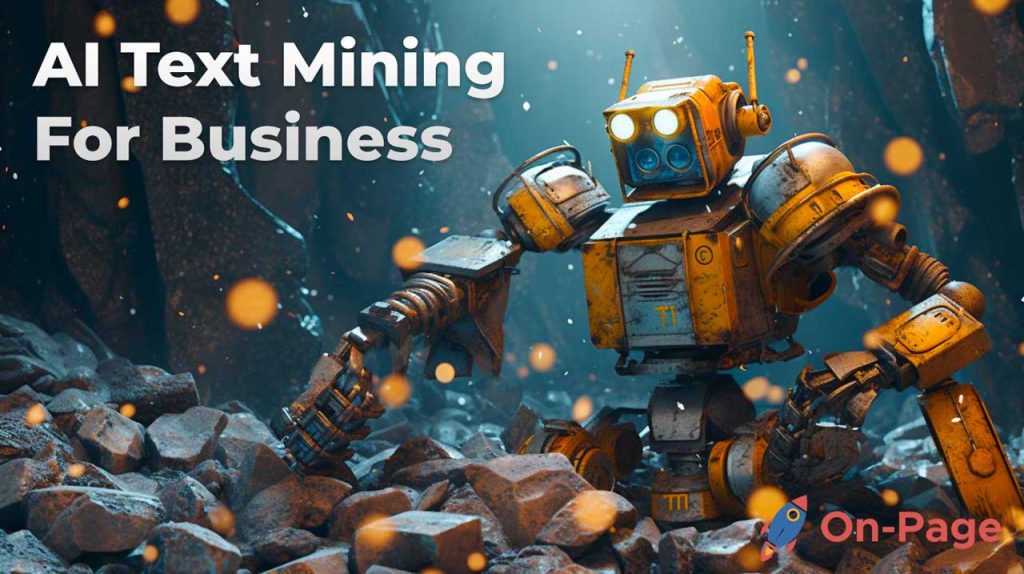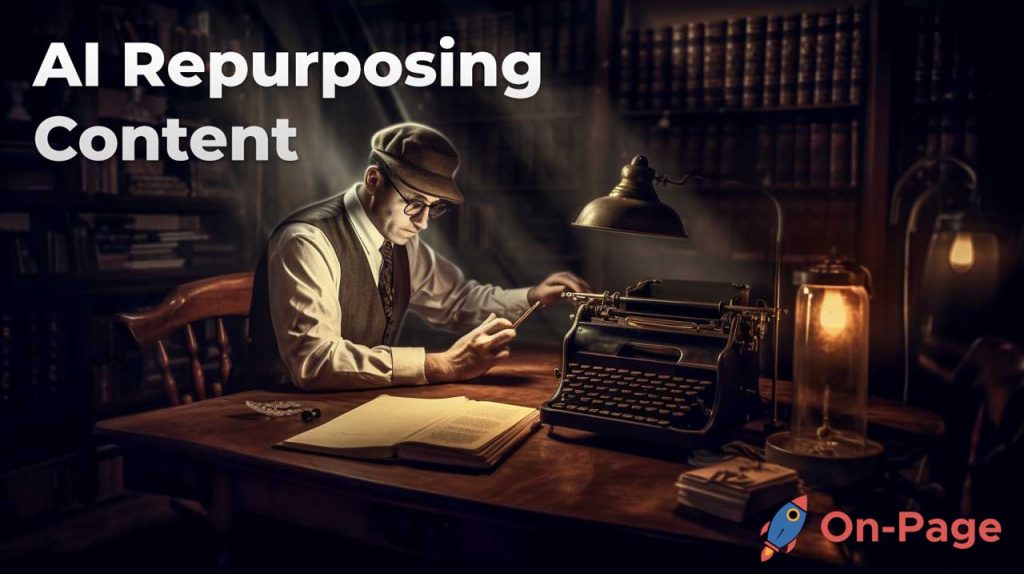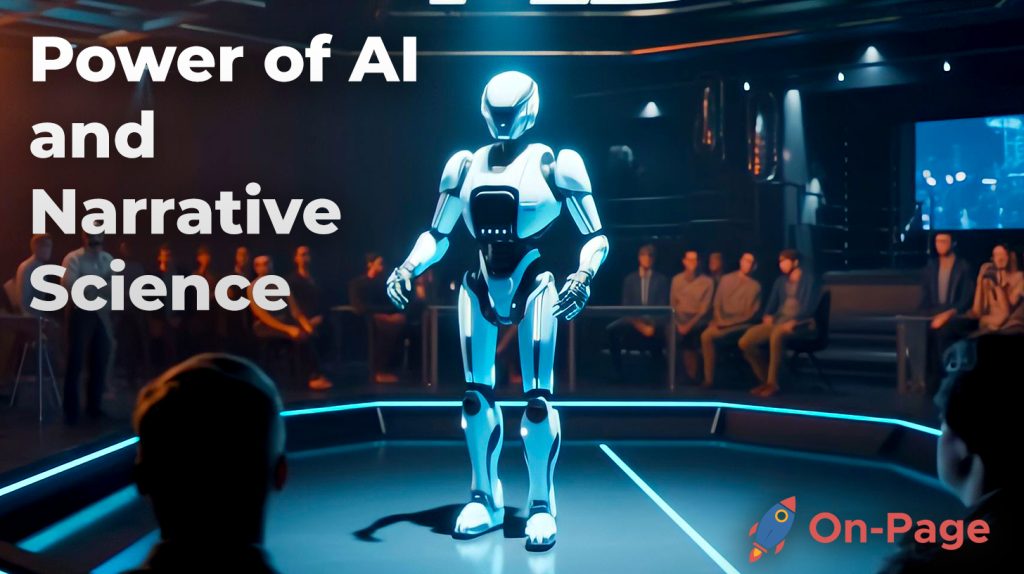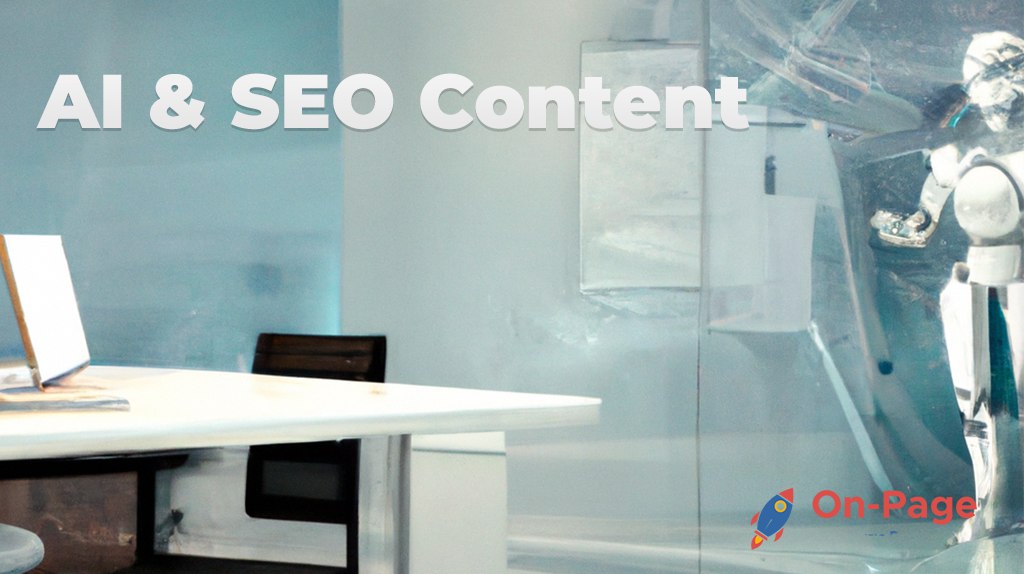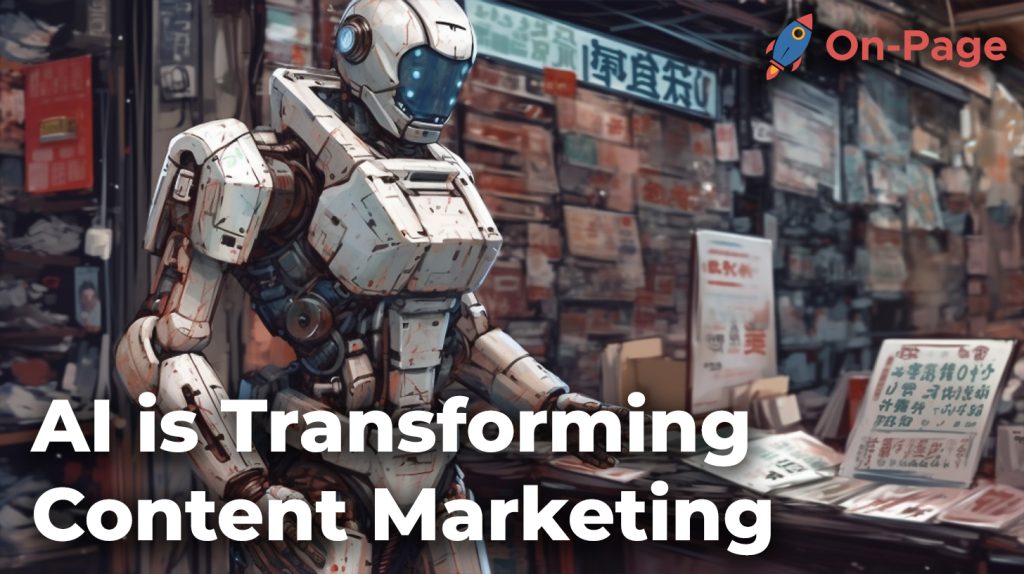
Imagine if you could cut your content marketing efforts in half while boosting your website’s engagement and conversions. It might sound like a far-fetched dream, but AI-driven content marketing is here to make it a reality. Gone are the days of spending countless hours brainstorming ideas, researching topics, and optimizing articles for SEO. Thanks to advanced AI technology, businesses can now transform their digital presence with just a few clicks. In this blog post, we will uncover the groundbreaking ways AI is revolutionizing content marketing and unveil how you can harness its power to supercharge your business growth like never before. So buckle up – your content strategy is about to take an extraordinary leap forward!
AI is transforming content marketing in various ways, from content creation to curation and optimization. With the help of AI, brands can create personalized content that resonates with their audience, automate otherwise time-consuming tasks like keyword research and performance tracking, and gain insights into customer preferences and behaviors to continuously improve their marketing efforts. As more marketers turn to AI-powered tools for support, we can expect to see a significant shift towards more effective and efficient content strategies that deliver better business results.
AI-Powered Content Creation
Content creation is undoubtedly one of the most time-consuming aspects of any content marketing campaign. However, with AI-powered tools like On-Page.ai, the process can be streamlined and simplified. AI can assist in various aspects of content creation from generating new ideas to writing full-length articles.
For example, On-Page.ai’s Stealth Writer is an advanced tool that uses natural language processing (NLP) to write full-length articles at the click of a button. All you have to do is input a keyword or topic, and the tool will generate an article that passes our AI detection criteria. This drastically reduces the amount of time spent on content creation, allowing you to focus on other aspects of your campaign.
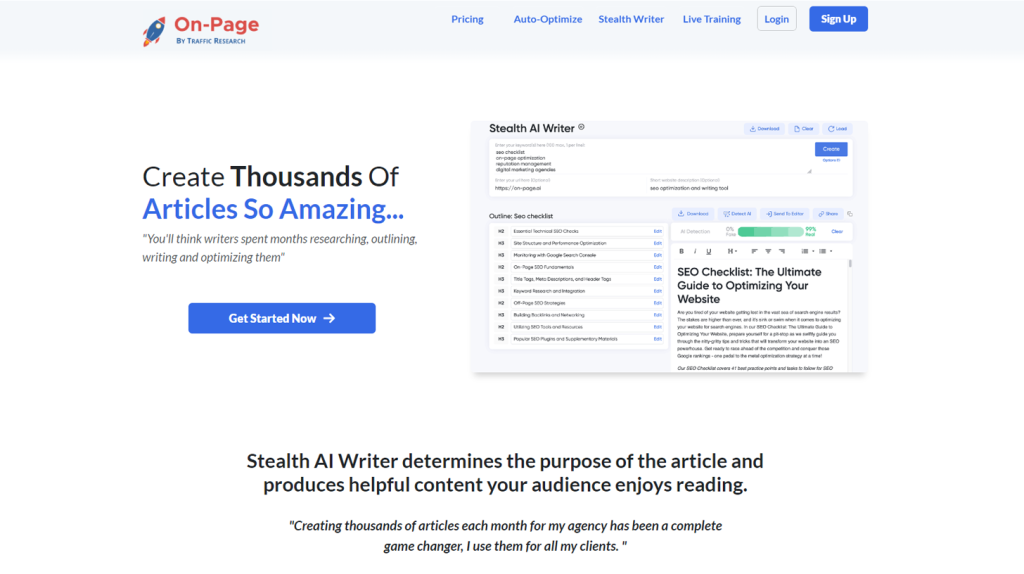
Furthermore, AI-powered content creation tools can help ensure that your content is more engaging and relevant to your target audience. By analyzing search trends and identifying high-performing keywords, these tools can help you create content that resonates with your customers.
However, some argue that using AI for content creation could result in low-quality content lacking emotional intelligence. While there may be some truth to this concern, it should be noted that advancements in NLP and machine learning algorithms have made it possible for AI-generated content to be indistinguishable from human-written material.
With that said, let’s move on to how AI is transforming personalization and targeted messaging.
Personalization and Targeted Messaging
One of the most significant benefits of using AI in content marketing is its ability to personalize messaging and create targeted content that resonates with your customers. By analyzing user data and behavior, AI-powered tools can identify customer personas and preferences to deliver tailored content.
For example, chatbots on websites and Facebook Messenger can use AI to provide customers with quick and immediate answers to their questions, making their journey more seamless and personalized.
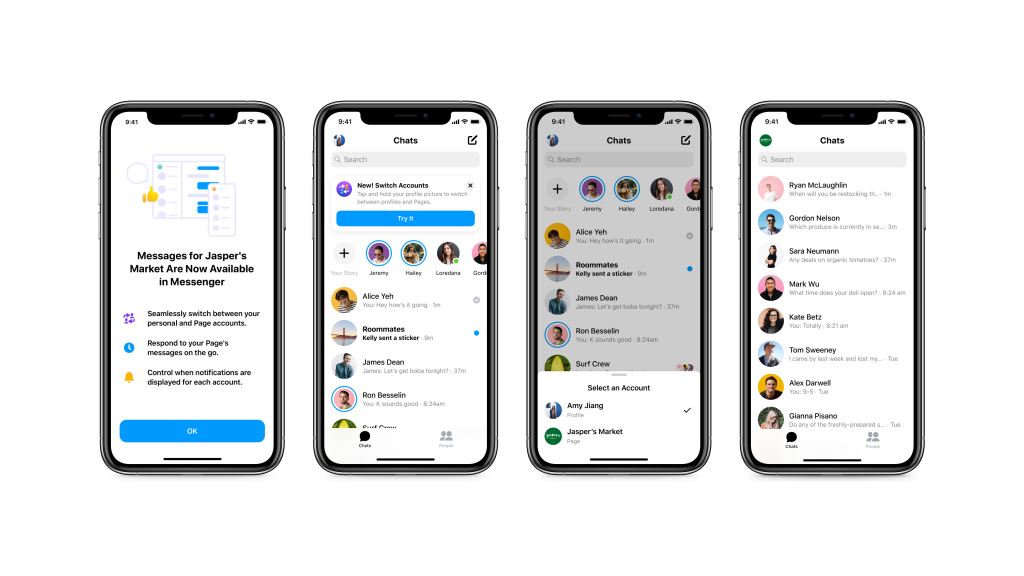
Additionally, AI tools can analyze search trends and customer behavior to generate unique page titles, meta descriptions, image alt tags, and article backlinks that cater to the target audience’s interests. This creates a uniformity of messaging that helps customers recognize the brand better.
Think of how music streaming platforms like Spotify personalize your listening experience by recommending songs you might like based on your past listening history. Similarly, AI-powered content marketing tools personalize the customer’s content consumption experience based on their previous actions and preferences.
However, there is concern about the privacy implications of using personal data to create targeted content. It’s important to ensure that any data used for personalization purposes is collected ethically and in compliance with relevant data protection laws.
Now that we’ve explored how AI is transforming content creation and personalization let’s move on to how it’s leveraged for content strategy development.
Consistent Brand Voice
Having a consistent brand voice across all platforms and communication channels is critical to building trust with your audience. When businesses maintain a constant tone and style in their messaging, customers know what to expect, and it can make them feel more connected to the brand. AI is becoming a valuable tool for content marketers looking to create consistency within their communications.
One excellent example of how AI can help maintain brand voice consistency is chatbots. By using NLP algorithms, these intelligent bots can analyze customer queries and provide them with customized responses. This ensures that every customer interaction fits with the business’s established tone, which is essential in establishing strong customer relationships.
A consistent brand voice is also essential when creating content on various platforms, from blog articles to social media posts. With an AI-powered content creation tool such as On-Page.ai, marketers can integrate branding elements consistently into each marketing communication piece. They can also ensure that key messaging and brand values are prominent in all their content.
Some may argue that relying on technology like AI dampens creativity in content creation. However, if used correctly, AI tools can improve creativity by reducing repetition and ensuring quality while still allowing writers to have a creative license within specific parameters.
Consider an art teacher who provides their students with different types of pencils but also provides guidelines on the type of sketch they should produce. The student has creative freedom within these limits, ensuring that the final product aligns with the instructional objective while still cultivating originality.
- In a survey conducted by McKinsey & Company, it was found that businesses adopting AI have seen improvements in their marketing and sales functions, with an average increase of over 20% in revenue generation.
- According to Gartner, it is predicted that by 2025, AI will be responsible for creating and managing 70% of all digital content across industries.
- A study from Salesforce indicated that more than half (51%) of marketers are already using AI-powered solutions in content marketing strategies to boost engagement and personalization.
Leveraging AI for Content Strategy

One of the biggest benefits of AI in content marketing lies in improving content strategy development. From identifying content gaps to assessing performance metrics post-publishing, AI helps streamline many aspects of a successful content marketing campaign.
AI can help determine keywords that will improve SEO rankings, suggesting new topics based on user searches and analyzing competitors’ content. On-Page.ai’s on-page scans can also help optimize website pages by generating unique page titles, meta descriptions, image alt tags, and article backlinks.
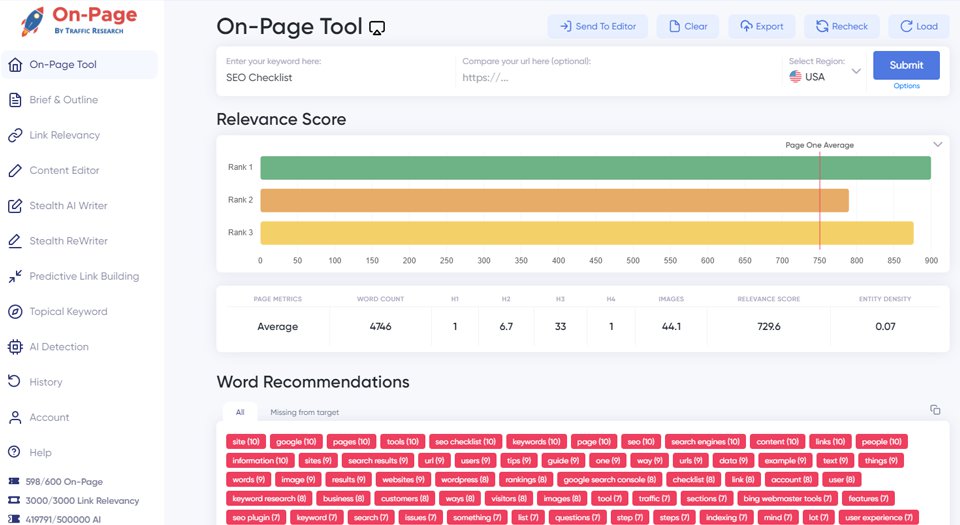
Additionally, AI is useful for analyzing data to discover patterns in customer behavior, industry trends, and competitor information. Content marketers can use this information to create relevant content tailored to their target audience and boost engagement rates.
However, some argue that AI-generated recommendations are not as accurate or personalized as human-generated insights. While it’s true that AI algorithms may miss more complex patterns within a given dataset, they can still highlight broad strokes when given the right parameters and direction.
Think of an AI tool like a compass pointing north. You must set the right course to get where you want to go. While the result won’t be perfect every time, setting the right goals and learning from mistakes will ultimately lead to success.
Keyword Research and SEO

The use of AI in content strategy has become increasingly popular due to its ability to handle complex data, providing insights to make better decisions and refine content with predictive analytics. One of the key aspects of content strategy is search engine optimization or SEO, where AI has become an indispensable tool that helps marketers optimize their content, improving visibility and driving more traffic to their websites.
Keyword research is one of the most crucial SEO tasks that help identify phrases or words that users would be searching for, and then optimize content accordingly. AI-powered keyword research tools make it easier for marketers to find relevant keywords, analyze their competition, and measure search volume, relevance, value, and click-through rates.
AI tools like On-Page.ai also use natural language processing techniques to suggest semantically relevant terms, along with long-tail keywords that can help increase rankings. These suggestions are based on additional metrics like keyword density and contextual usage. With On-Page.ai, marketers can easily scan their web pages for the most important words on-page and have these recommendations directly incorporated into their page copywriting process.
SEO ranking factors often change over time and what works for SEO today might be outdated tomorrow. It’s essential that marketers stay on top of these trends to ensure consistent results. AI-powered SEO tools not only keep track of these updates but can also analyze past performance data to see if your current strategy needs revisions or if there is a need to employ newer tactics to meet goals.
However, AI-powered SEO tools are not perfect, and some might argue that they lack the nuance that human thinking brings to the table. Indeed, human experts can combine domain expertise, intuition, and critical thinking to uncover insights overlooked by standalone AI. Besides, AI-powered content optimization is based on algorithms developed by machines which means they may not be able to identify spots where the copy is weak or where improving the story would make a significant impact.
To put it bluntly, popular AI-powered SEO tools use data science approaches, mixed with neural networks to optimize website ranking factors; yet what they don’t have is years of experience in online marketing and user understanding to bring qualitative change. Think about it as a robotic janitor cleaning floors – superficially cleaning every nook and cranny but unable to clean deep dents in the woodwork. It’s up to businesses to decide if they want to rely solely on machines or invest in both domain knowledge and machine learning techniques.
While there are pros and cons to adopting AI-powered SEO tools for your content strategy, their benefits outweigh the risks when used appropriately. One aspect where AI-powered SEO tools come into play is evaluating content performance.
Content Performance Analysis
The effectiveness of content depends on how well users engage with it. Engagement could mean an increase in traffic, page views, longer time spent on the site, or a higher number of social media shares. Whatever metrics a business uses to determine engagement rates, AI-powered analysis tools can help monitor and fine-tune digital marketing strategies for continued success.
On-Page.ai offers robust analytics tools as part of its service suite. These on-page tools allow marketers to gain valuable consumer insight through behavior monitoring that can be used to enhance future campaigns. They do so through checklists that compare pages against essential SEO factors such as meta descriptions, tags, organic rankings, and keyword targeting. The suite provides deep insights on every piece of content hosted on the website which will help businesses revise their content strategy, staying ahead of competition by always knowing what works for customers now and in the future.
AI-powered analytics tools also add an important layer to customer engagement analysis. In addition to quantifiable metrics like page views, bounce rates, and exit rates, AI can provide insights based on user behavior and consumer perception.
Putting this technology into practice allows marketers to develop an in-depth understanding of what engages users, and make informed decisions on how they can improve their content strategy. By consistently iterating upon this data over time – these points are measured in days and can even be made live immediately – clients who utilize these types of services gain more flexibility with testing against different scenarios while increasing organic user traffic simultaneously.
Of course, like any marketing tool, there are pros and cons when adopting AI-powered analytics tools. Some marketing specialists might see it as a crutch that prevents them from thinking creatively instead of focusing solely on quantitative goals. Others might fear losing too much control over their marketing strategies if their data still lies within one app provider’s domain expertise.
At times it might feel as if relying entirely on analytics puts businesses at risk of losing the human touch from their advertising approach. One could compare it to learning a new language using Google Translate rather than investing in the effort required to acquire fluency; only being able to connect specific keywords without fully grasping context leads to communication gaps and misunderstandings meant to be avoided.
User Engagement and AI

User engagement is a crucial metric for any business that wants to succeed online. AI algorithms can help marketers understand user behavior and preferences to create more personalized content that resonates with their target audience. Using AI, businesses can perform sentiment analysis to track user feedback on social media and other channels, monitor click-through rates and user engagement statistics to determine which content is performing well, and optimize content based on user behavior.
One of the most significant benefits of using AI for user engagement is the ability to provide more personalized content. With access to data such as past purchases, search queries, and online activity history, businesses can tailor their messaging more effectively toward each user. This sort of one-to-one communication strengthens the customer relationship and increases brand loyalty.
Using machine learning algorithms, businesses can also automate interactions with users in real time. For instance, chatbots are becoming increasingly popular in the customer service space, providing users with immediate answers to their questions at any time of day or night, driving engagement, and reducing response times.
Take the example of Netflix, which uses AI algorithms to suggest movies or TV shows to its users based on their viewing history. This has contributed significantly to making the platform more accessible for viewers who often have plenty of options when choosing movies or TV shows. In turn, this increase in personalization has reduced churn rates while increasing user satisfaction.

Data science also plays a critical role in analyzing metrics such as bounce rates and time spent on pages to identify high-performing content within websites. Marketers can then use this insight to modify existing pages and develop new ones that will keep visitors engaged for longer, driving conversions.
While some may argue that using AI for user engagement might make marketing too clinical or impersonal, thoughtful implementation of these technologies can help brands improve relationships with customers by providing even more tailored messaging than before.
Think of AI as a sort of extension of your own team. Just as you’d use data insights and customer feedback to inform how interactions take place in person with customers, AI can help extend these efforts online across various digital touchpoints.
With the benefits of using AI for user engagement becoming clearer by the day, it’s worth examining how this technology can help businesses stay ahead of the curve in the world of content marketing.
Future Implications of AI in Content Marketing

The future implications of AI in content marketing are many. As marketers continue to embrace these technologies, we’re likely to see even more significant leaps forward in areas such as personalization and automation. With everything from chatbots and retail applications to predictive analytics and search engine optimization already seeing wide adoption, there is an increasing number of ways businesses can harness AI tools for improved content marketing outcomes.
For instance, in the coming years, we’re likely to see widespread adoption of predictive analytics to help marketers create more individualized content that will resonate better with their target audience. This technology can also be useful for identifying patterns and trends that might otherwise go unnoticed, further boosting engagement rates.
Another area where trends have been emerging recently is in the use of virtual assistants for content creation. By using machine learning algorithms to evaluate usage data like audience engagement metrics, virtual assistants like Persado are already producing high-quality messaging and copy at scale more efficiently than human writers could ever hope to do so manually.
There’s no doubt that AI-powered solutions like On-Page.ai will continue to shape the content marketing landscape into the foreseeable future. Whether it’s optimizing for search engines or crafting more personalized messaging across multiple channels, there’s little doubt that businesses that invest in these technologies today will reap rewards when it comes to customer engagement tomorrow.
Consider how Hubspot’s SEO tool generates highly relevant keywords based on specific information about your site. This takes the work out of research that previously might have taken hours to complete, making it easier and more efficient to include keywords in content.
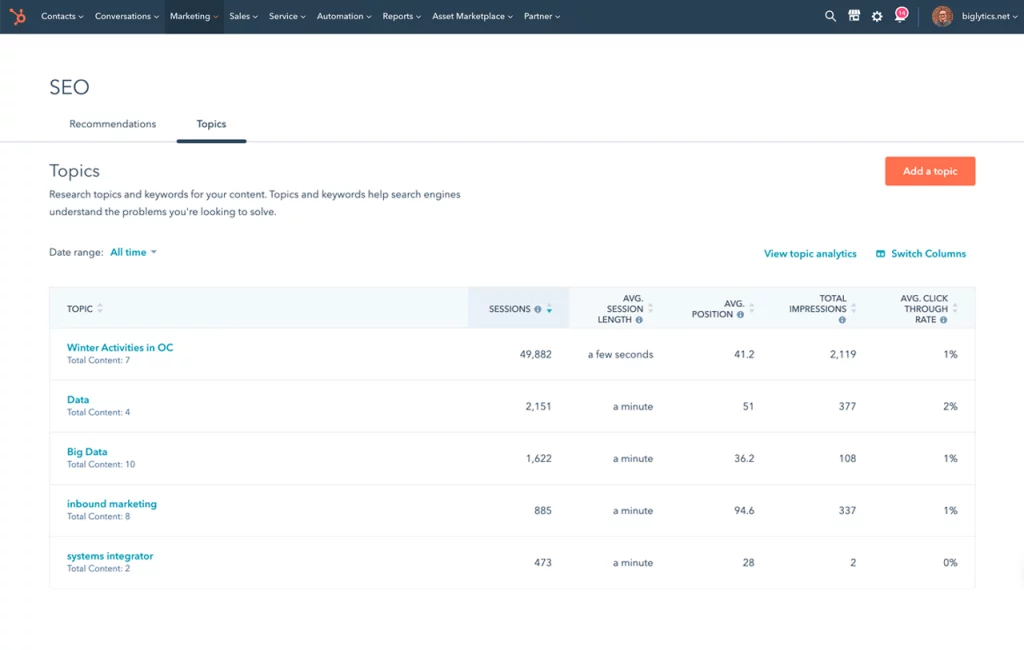
By automating these processes, businesses can dramatically improve their online visibility, boosting engagement and increasing revenue. The automation of these tasks also frees up marketers’ time to focus on more strategic elements of their jobs while still achieving better outcomes with less effort.
However, there are also many critics who argue that AI-powered tools represent a dangerous step toward automated content production and the dehumanization of marketing. They believe that these technologies may soon take over what was once a collaborative process between human writers and teams, potentially resulting in lower-quality content and decreased engagement rates.
Much like how any new technology can be leveraged for good or ill depending on how it is used, it will be up to individual businesses to determine whether AI-based solutions like On-Page.ai become a powerful tool or a liability in the years to come.
All of this means that now is the time for businesses to consider how they can leverage On-Page.ai in their existing content marketing strategies. Whether it’s through greater personalization, optimized customer experiences, or deeper insights provided by predictive analytics models, AI has the potential to revolutionize content marketing as we know it today.
Frequently Asked Questions Answered
Can AI improve the personalization of content for individual consumers?
Yes, AI can drastically improve the personalization of content for individual consumers. With the help of advanced algorithms and machine learning techniques, AI can analyze a vast amount of data about customer behavior, preferences, and interests to create highly targeted and relevant content that resonates with each individual.
According to a recent study by Evergage, 88% of marketers reported seeing measurable improvements due to personalization, with more than half reporting a lift greater than 10%. Additionally, research by Accenture shows that 91% of consumers are more likely to shop with brands that deliver personalized content and offers.
AI-powered personalization empowers businesses to create highly tailored experiences for their customers, which drives engagement, loyalty, and ultimately revenue. By providing customers with personalized recommendations and suggestions based on their unique needs and interests, businesses can build strong relationships with their customers.
Overall, the integration of AI into content marketing provides tremendous opportunities for businesses to leverage data and insights in order to drive significant results through smart targeting and personalization.
How can companies integrate AI into their current content marketing strategies?
Gladly! Companies can integrate AI into their content marketing strategies in various ways, such as utilizing chatbots to engage with customers, analyzing data to personalize content, and generating automated content.
Chatbots have become increasingly popular in recent years, with studies suggesting that chatbots could save businesses up to $8 billion per annum by 2022. By using chatbots to interact with customers, companies can greater handle customer inquiries and personalize their experiences. Additionally, chatbots can help companies collect valuable data that they can use to improve future content marketing efforts.
Data analysis is another way companies can integrate AI into their content marketing strategies. With the abundance of data available online, AI-powered analytics tools can sift through large amounts of consumer data and offer valuable insights into what types of content consumers are consuming. This information can help businesses tailor their content marketing approaches to better engage and convert their audiences.
Lastly, companies can use AI-generated content to further automate their content marketing efforts. This technology utilizes natural language processing algorithms that produce written content on any topic at a much faster pace than humans. With this technology, companies can generate a significant amount of unique and quality content for their websites and social media accounts while saving time and money.
In conclusion, the integration of AI into a company’s current content marketing strategy is imperative if they wish to remain competitive in today’s digital landscape. AI-powered chatbots, data analysis, and automated content generation will enable businesses to produce high-quality content faster and more efficiently while providing an unparalleled customer experience.
Are there any ethical concerns surrounding the use of AI in content marketing?
Yes, there are ethical concerns surrounding the use of AI in content marketing. One major concern is the potential for AI to perpetuate biases and discrimination. AI algorithms can only learn from the data they are fed, which means that if it is trained on biased or incomplete data, it will produce biased outputs. For example, an AI-powered hiring tool developed by Amazon was found to be discriminatory against women due to its training data being predominantly male.
Another concern is the potential misuse of personal information. As AI is able to collect vast amounts of data on individuals, there is a risk that this data could be used without consent or exploited for unethical purposes such as targeted advertising or political manipulation.
Furthermore, as AI continues to advance and become more sophisticated, there is a possibility that it could replace human jobs and result in widespread unemployment.
It’s important for businesses utilizing AI in content marketing to prioritize ethical considerations and transparency. Clear communication with customers about how their data is being used and ensuring that AI algorithms are regularly audited for bias and fairness is crucial.
According to a study by PwC, 82% of consumers want companies to clearly explain how they’re using their data. Moreover, research done by Edelman reveals that 81% of consumers say trusting a brand matters more today than in the past. These statistics highlight the importance of transparency in maintaining customers’ trust and avoiding potential ethical issues surrounding AI use in content marketing.
In conclusion, while AI offers tremendous opportunities for innovation in content marketing, there are also significant ethical considerations that must be taken into account to avoid unintended consequences.
What specific tasks within content marketing can AI assist with?
AI is already transforming content marketing, and it has the potential to revolutionize this industry in countless ways. Among the areas where AI can assist in content marketing are:
- Content Creation – AI technology can generate written and visual content, like articles, blog posts, social media posts, and ad creatives. Automated writing platforms such as Wordsmith and QuillBot are using NLP algorithms to create personalized stories and reports for brands. According to a study by MarketsandMarkets, the AI-based content creation market will be valued at US$900 million by 2023.
- Content Optimization – AI-powered tools like Atomic Reach provide real-time data on how effective your content is and suggest changes to optimize it for better performance. Additionally, AI can also help ensure content meets SEO metrics by suggesting appropriate titles based on keyword analysis.
- Audience segmentation – AI can help marketers segment their audiences more accurately since machines can analyze vast amounts of data far quicker than humans ever could. This ability helps identify audiences’ needs and offers relevant and accurate information about various products and services.
- Personalization – With machine learning capabilities, brands can personalize their communication with customers through chatbots or email automation systems that respond in real-time.
Overall, AI is enhancing customer experience in content marketing since AI offers tremendous efficiencies through cost reduction along with targeting more qualified leads that convert better for businesses in the long run.
How can AI analyze and optimize SEO for content marketing?
AI has revolutionized SEO optimization for content marketing by allowing businesses to analyze and optimize their online presence with a level of precision and speed that was previously unattainable.
One key advantage of AI lies in its ability to conduct in-depth keyword research, which helps marketers identify the most effective keywords and phrases to use in their content. By analyzing search trends over time, AI algorithms can pinpoint the topics and terms that are most relevant to a particular audience, allowing marketers to tailor their content accordingly. Moreover, AI can help businesses keep track of their competitors’ search engine rankings by constantly monitoring their keywords and activities.
Another way AI improves SEO is through NLP technology, which analytically reads web pages at scale and identifies key areas for optimization such as meta descriptions, H1 tags, and internal and external linking. With this information easily accessible, webmasters can instantly determine strategies for improving page rank.
According to a report published by MarketsandMarkets, the global artificial intelligence market size is set to grow from US$21.5 billion in 2018 to US$190.6 billion by 2025, showcasing the increased adoption rates across multiple sectors including marketing.
In conclusion, AI-powered writing tools like On-Page.ai provides a wealth of opportunities for businesses to streamline and enhance their SEO efforts for content marketing. By leveraging this technology effectively, companies can ensure they reach the right audiences at the right time while maximizing visibility on SERPs.

